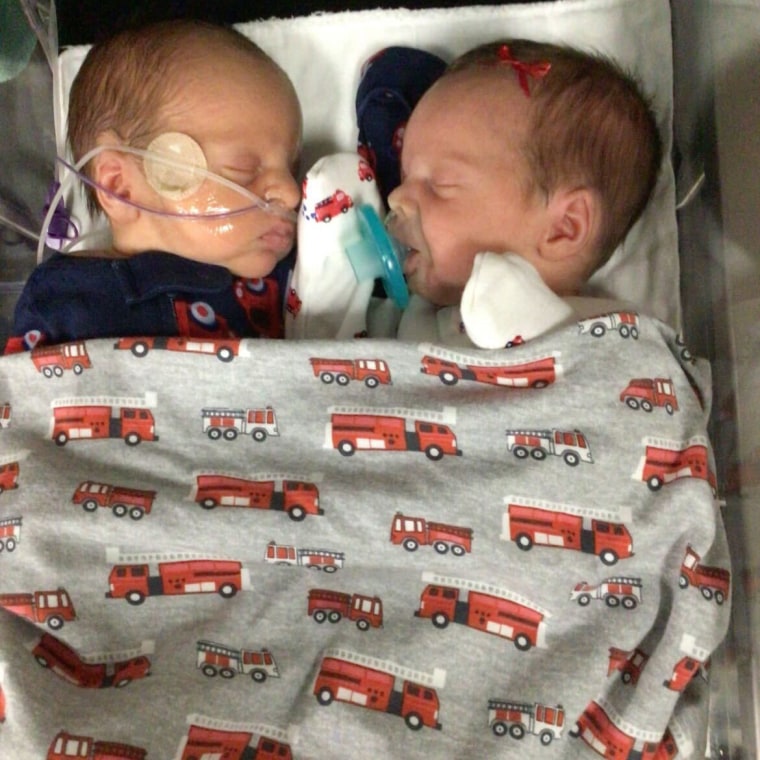
A Utah woman has died of a rare heart condition, just nine days after she gave birth to twins, NBC News reports.
Morgan Hughes, 23, of Benjamin, always wanted to become a mother and was overjoyed when she delivered a boy and a girl Dec. 19, her family said. Hughes recovered well after childbirth and was discharged from the hospital days later. The twins, who were about six weeks premature, were sent to the neonatal intensive care unit to get stronger, said Hughes’ father, Brian Hodson.
Hughes and her husband, Sam Hughes, also 23, named the twins Hudson and Georgia and visited them in the NICU, eager to bring them home.
But around a week after she gave birth, Hughes started feeling off. Hodson said she vomited and fainted, and thought she may have had a seizure. She returned to the hospital, where Hodson said doctors discovered fluid around her heart. They diagnosed her with postpartum cardiomyopathy, also called peripartum cardiomyopathy, a rare form of heart failure that happens when the heart muscle weakens toward the end of pregnancy or up to about five months following delivery.
We've got the news you need to know to start your day. Sign up for the First & 4Most morning newsletter — delivered to your inbox daily. >Sign up here.
In some cases, peripartum cardiomyopathy can be managed with medication to improve cardiac function and combat fluid retention if diagnosed early enough. But the condition can be difficult to detect because symptoms of cardiac failure — such as shortness of breath and swelling in the feet and legs — can mimic pregnancy symptoms, according to the American Heart Association.
Hughes deteriorated rapidly and received care in the intensive care unit, Hodson said. On Dec. 28, she died after going into cardiac arrest.
“It’s been devastating. We certainly weren’t expecting this at all,” said Hodson, who lives in Cedar Hills, Utah, about 30 miles north of Benjamin.
U.S. & World
The day's top national and international news.
Hughes could not wait to start life as a family of four, Hodson said, adding that the twins’ delivery had been “extremely smooth.”
“She’s always wanted to be a mom and has loved babies forever,” he said. “She was known as the baby whisperer, even when she was young.”

The cause of peripartum cardiomyopathy is not clear. Experts say there appear to be several risk factors, including pregnancies involving twins or other multiples, a maternal age of 35 or older and high blood pressure, including pre-eclampsia, a serious pregnancy complication characterized by elevated blood pressure. Hodson said Hughes had been diagnosed with pre-eclampsia late in her pregnancy but was otherwise healthy.
Peripartum cardiomyopathy is estimated to occur in about 1 in 2,000 live births, with Black women more likely to develop it, according to Dr. Patrick S. Ramsey, chief of maternal-fetal medicine at UT Health San Antonio in Texas.
“It’s a condition that is increasing in frequency over the past several decades, and we don’t know exactly why,” said Ramsey, who helped write the American College of Obstetricians and Gynecologists’ guidance on cardiovascular disease and pregnancy but did not treat Hughes.
Hodson described his daughter, who had recently graduated from cosmetology school to become a hair stylist, as “the most caring, loving, funny” person.
Shortly after she died, hospital staff at Utah Valley Hospital in Provo wheeled Hughes’ twins from the NICU over to her room, placing one baby in each of her arms for a final goodbye as her stunned family gathered around, Hodson said.
“It was kind of both a nice image to remember, but a hard image to think about,” he said. “It was really sweet, but devastating.”
The hospital declined to comment, citing patient privacy laws.
The twins are still in the NICU and are expected to be released at some point later this month. Morgan’s husband, who declined to be interviewed, has been “a rock star,” Hodson said, frequently coming to the NICU to feed, bathe and bond with his babies as he grieves the loss of his wife. The couple was married in 2023.
Hodson and Hughes’ mother, Christy Hodson, have joined for many of the NICU visits with their grandbabies.
“You sit and hold them and just stare at them,” Hodson said. “It’s the best place to be, but to me, sometimes it’s the hardest place to be, because you’re sitting there going, well, Morgan should be holding the babies. Morgan should be feeding the babies.”
Hughes’ death is one of hundreds of maternal deaths that occur each year in the United States, many of which are preventable.
In 2022, the most recent data available, 817 women died of maternal causes in the United States, according to the Centers for Disease Control and Prevention’s National Vital Statistics System. The World Health Organization defines maternal deaths as those that take place during pregnancy or within 42 days after delivery.
“That number of 800 is unacceptable,” Ramsey said. “I think we have a lot of great work to do to try to improve that.”
There has been some progress: CDC data shows that the national maternal mortality rate for 2022 decreased to 22.3 deaths per 100,000 live births, compared to a rate of 32.9 in 2021. (Some experts believe the pandemic contributed to the rate being particularly high in 2021.)
Hodson said he hopes the twins will grow up knowing how much their mom adored them.
“That’s all she wanted in life, was to be a mom,” he said. “She would have loved them more than anything.”
This story first appeared on NBCNews.com. More from NBC News:



